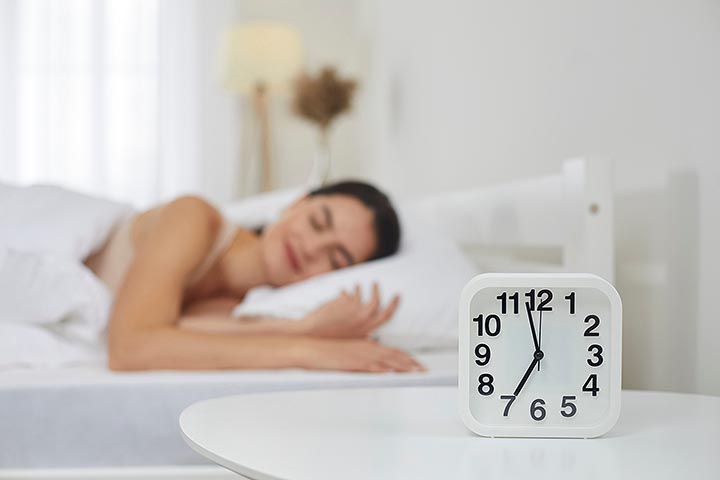Sleep Support
Help Maintain Your Sleep Schedule During Daylight Savings Time

It’s early March, and you are well in the groove of your daily routine. You know your schedule and you may even feel on top of things. And then you realize... it’s time for Daylight Savings. It’s time to lose an hour of sleep! While you can look forward to having longer days, you remember how tired you feel after the time change.
Sleepy, groggy, tired, and confused – no one enjoys feeling this way. These can be just some of the impacts of the big switch to daylight savings time in March. But fear not! There are things you can do to help. Keep reading to learn good sleep habits to help keep your circadian rhythm on track during daylight savings.
What is daylight savings time?
Daylight saving time, often referred to as daylight savings (with an s) time, is the official move to change the clocks and move our time ahead an hour in the early spring. This change allows us to enjoy more sun-filled hours in the evenings but reduces the amount of sunlight in the mornings.
While many people believe it was created for farmers, it was first conceived by Benjamin Franklin to save energy costs and add more daylight hours. The US Congress officially passed daylight saving time in 1966, but the switch was formalized in 2007 to the weekends we now have.
When is daylight savings time?
On the second Sunday in March, daylight savings starts and the clocks move forward an hour at 2 am. On the first Sunday in November, daylight savings ends and the clocks shift back an hour at 2 am to Standard Time.
Hawaii, most parts of Arizona, American Samoa, Guam, the Northern Mariana Islands, Puerto Rico, and the U.S. Virgin Islands do not take part in daylight savings time.
While the energy savings and value of daylight have changed since this first was enacted, one thing we now know is that there is an impact of daylight savings time on your circadian rhythm.
What does daylight savings do to your sleep?
Switching to daylight saving time has several impacts on your body. While it may only be an hour different, because of how this change interacts with sunlight and schedules, it can feel like a big change.
Changes to Circadian Rhythm
One of the biggest impacts that daylight savings time has on your body is that it disrupts your circadian rhythm. Your circadian rhythm is also known as your internal body clock or your sleep/wake cycle. This is your internal clock that tells you when to sleep and when to wake up. Your circadian rhythm depends on cues of natural outside light, and everyone is unique in how their body relates to those cues. This is why some people feel better if they stay up later at night and sleep in, while others prefer to start their day earlier and go to bed earlier.
Melatonin Shifts
The daylight savings time change impacts how your body creates melatonin. Exposure to light later in the day suppresses your body’s secretion of melatonin, making it harder to fall asleep and then wake up in the morning.
Disrupts sleep schedule
Daylight saving time takes away an hour of sleep on the first night. However, more importantly, it adjusts your sleep schedule further from aligning with the natural times of sunrise and sunset, so can make it harder for your body to adjust.
Daytime fatigue
Not getting enough sleep at night can lead to daytime fatigue. That makes it harder to complete your work and take care of you or your family.
Good sleep habits
There are many benefits to having a good sleep routine, including making it easier to adjust to the time change after daylight savings. Regularly getting 7-9 hours of sleep a night is important for helping to support your body’s health.
Tips to help minimize the impact of daylight savings
The good news is that there are steps to take to help make the transition to daylight saving time easier for you and your body. Check out these tips that may help.
Fall back on sleep hygiene
The same healthy sleep habits that can help improve your sleep every night, can also help you recover from the change to daylight savings time. You can use these good sleep hygiene habits to help you adjust to the new sleep schedule and have a healthy bedtime routine.
In general, these habits can help improve your sleep:
- Going to bed and waking up around the same time each day
- Being screen-free an hour or so before bed
- Making your bedroom relaxing, cool, and dark
- Avoid using caffeine or nicotine late in the day
Gradually adjust sleep and wake times
If you can, start by moving bedtime and wake-up time by 15-20 minutes each day, for a few days before Sunday, as you can help transition your body to the new time.
Adjust other daily routines
Adjust the timing of your other daily routines, like mealtimes, naptimes, and key activities to align with the new time.
Jump ahead
Before going to sleep Saturday evening, set your clocks ahead an hour to the new time. Remember that smartphones and some devices will change times automatically and don’t need to be reset. Try to go to bed according to the new time, it can help you adjust to the new schedule the following morning.
Follow the light
Use light and darkness cues to help adjust your schedule. A sunrise alarm clock can help mimic natural dawn or morning light by gradually getting brighter leading up to the alarm. When you wake up on Sunday, try to go outside to get some natural sunlight to help teach your body the new cues.
Try some melatonin
Melatonin can help regulate your sleep cycle and support sleep.* vitafusion offers several different Melatonin gummies for sleep support:*
- Melatonin – With 3 mg of melatonin per serving, these great-tasting white tea- and peach-flavored gummy supplements help regulate your sleep cycle.*
- Extra Strength Melatonin - These tasty blackberry-flavored gummy supplements support sleep with 5mg of melatonin in every 2 gummies.*
- Max Strength Melatonin - Delicious strawberry flavor with 10mg of melatonin in 2 gummies that helps regulate your sleep cycle.*
- Melatonin + Magnesium – these delicious gummies provide 5 mg of melatonin and 40 mg of magnesium per serving.
Stress Less During Daylight Savings
Remember that the move to daylight savings time can have a big impact on your sleep and your health, but there are steps you can take to help. Prioritize getting enough sleep and use light cues to help your body adjust to the new schedule. While some legislators are looking into permanently getting rid of the time change, for the moment Daylight Savings Time is here to stay. With vitafusion™ melatonin gummies and good sleep habits, you can rule your day!
Brought to you by the vitafusion™ nutrition experts.



